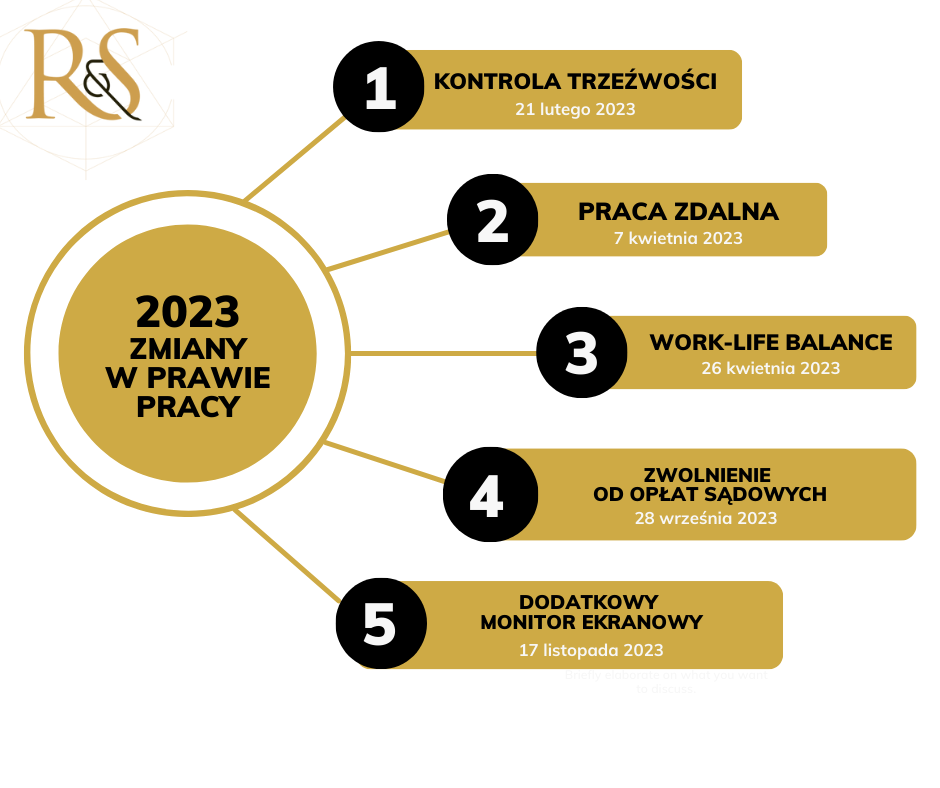The year 2023 was undoubtedly groundbreaking in terms of labor law changes eagerly awaited by both employers and employees. The provisions on telework were removed from the Labor Code and replaced with regulations on remote work. Changes were also introduced concerning employee sobriety checks, and two EU directives, including the work-life balance directive, were implemented into Polish law.
End of Telework. Remote Work.
On April 7, 2023, the provisions on telework were removed from the Labor Code and replaced with long-anticipated regulations on remote work. Employees can now perform work remotely either entirely or partially (hybrid model) from a location chosen by the employee, provided it is agreed upon with the employer in each case.
As a result of this change, employers are required to regulate the principles of performing remote work:
- through an agreement with the trade union organization,
- in the remote work regulations,
- or in individual agreements.
Sobriety Control
As of February 21, 2023, employers may introduce “preventive” sobriety checks for employees or tests for substances with effects similar to alcohol if necessary to ensure the protection of employees’ or other persons’ life and health or to safeguard property.
The rules for conducting sobriety checks must be regulated in the collective labor agreement, workplace regulations, or an official notice.
Importantly, these provisions also apply to individuals employed under civil law contracts, such as contracts for specific work or mandate contracts.
Work-Life Balance
Another groundbreaking change in 2023 was the implementation of EU directives into Polish law:
- Directive 2019/1152 (transparent and predictable working conditions),
- Directive 2019/1158 (work-life balance for parents and caregivers).
The changes covered various aspects. In terms of parenthood, new provisions introduced flexible work arrangements for employees raising a child up to the age of 8 and modified parental leave limits.
The Labor Code also introduced additional leave entitlements:
- Care leave (5 days),
- Leave due to force majeure (2 days or 16 hours).
Changes in Employment Contracts
Under the amendment to the Labor Code, effective April 26, 2023:
- Employers are required to provide a reason justifying the termination of a fixed-term employment contract.
- The rules for concluding probationary contracts were modified.
- The employer’s obligation to inform employees about employment conditions was expanded (including information on promotion opportunities, job openings, salary components, and financial or in-kind benefits).
- Employers were prohibited from restricting employees’ ability to work simultaneously for another employer.
Changes in Labor Law Court Proceedings
In 2023, changes were also made to regulations concerning labor law court proceedings. Court fees for lawsuits filed in labor disputes were abolished, regardless of the value of the claim. Additionally, employment stability was reinforced by introducing changes in the obligation to employ a worker until the final conclusion of court proceedings.
If a first-instance court rules that the termination of an employment contract is ineffective or reinstates an employee, upon the employee’s request, the court must order the employer to continue employing the individual under the same conditions until the final conclusion of the proceedings.
Furthermore, a new provision allows for securing employment by issuing an order for continued employment until the final conclusion of the proceedings. However, this applies only to employees who benefit from special protection against termination with or without notice.
Display Screen Monitors
As of November 17, 2023, new occupational health and safety regulations apply to workplaces equipped with display screen monitors. Employers have until May 17, 2024, to adapt existing workstations with display screens to the minimum health and safety and ergonomic requirements specified in the regulation of the Minister of Labor and Social Policy on occupational health and safety at workplaces equipped with display screen monitors.
This does not apply to workplaces established after November 17, 2023. In such cases, employers must immediately comply with the requirements specified in the aforementioned regulation.

Other Notable Changes
Honorary blood donors and distinguished blood donors have now been permanently granted leave from work and official duties:
- on the day of blood donation,
- on the day following blood donation,
- for the time of periodic medical examinations.
Previously, this entitlement was granted only during an epidemic or epidemic emergency.
In 2023, changes were also made to the basis for calculating contributions to the Company Social Benefits Fund (ZFŚS), and the list of jobs prohibited for minors was modified.
Summary
The year 2023 was exceptionally intensive in terms of labor law changes. However, this is not the end! Further changes are expected in 2024, and we will continue to provide updates in future articles.





